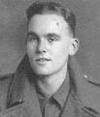Keyes, Sidney oldala, Angol életrajz
Életrajz
Sidney Keyes , British Poet (Born 1922 Died 1943).
He was born Sidney Arthur Kilworth Keyes on the 27th May 1922 at The Homestead, West Hill, Dartford in Kent, the only child of Reginald Keyes, a flour miller by trade and a former army captain, and his second wife, Edith Mary. His mother died from peritonitis when he was only six weeks old, and so he was sent to live with his paternal grandfather, Sidney Kilworth Keyes, a local farmer. Since he was rather a frail child, he was not allowed to mix with other children, and so led an isolated and lonely childhood which inevitably led him to seek solace and diversion in reading. He was eventually sent to a preparatory school in Dartford at the age of nine, and two years later attended Dartford Grammar School until the age of fourteen when he went to Tonbridge School.
He wrote his first serious poem Elegy after the death of his grandfather in 1938 and by the time he left school in July 1940 he had written another seventy poems which were all later discovered in a manuscript book. In October 1940 he went to Queen's College, Oxford to read history and met John Heath-Stubbs who helped him to develop and perfect his poetic technique. At Oxford he also became editor of the student newspaper Cherwell, and collaborated with Michael Meyer to edit the anthology Eight Oxford Poets which appeared in 1941.
Throughout his Oxford years he wrote a poem a week, including Remember your Lovers, which he wrote in an examination hall, after he had finished one of his papers early. By the end of 1941 he had enough poems to form the basis of his first volume, The Iron Laurel, although he held back publication until 1942 in order to give himself enough time to finish The Foreign Gate, a rather long poem which featured the character of Death.
His education was interupted when he decided to enlist in the army in April 1942. He completed his officer training at Dunbar and was later commissioned as a second lieutenant in Queen's Own Royal West Kent Regiment. He continued to write poetry and his Dido's Lament for Aeneas, Rome Remember and North Sea, a lament for his unrequited love for Milein Cosman, all date from this period in his life.
His regiment arrived at Algiers in April 1943 to take part in the final stages of the Tunisian campaign. There Keyes saw a fortnight's fighting before he was killed in action near Sidi Abdullah on the 29th April 1943. According to James Lucas, he was "a gallant Christian gentleman who sacrificed himself for the men under his command". He was buried in the Massicault War Cemetery in Borj-el-Amri.
A second volume of poetry The Cruel Solstice was published shortly after his death, which togther with The Iron Laurel was awarded the Hawthornden prize. His collected poems were edited by Michael Meyer and appeared in 1945. A new edition was republished in 2002 with the addition of a few previously unpublished poems and some memoirs contributed by friends. Together with Keith Douglas and Alun Lewis, Sidney Keyes is regarded as one of the outstanding British poets of World War II.
(Az oldal szerkesztője: P. T.)



